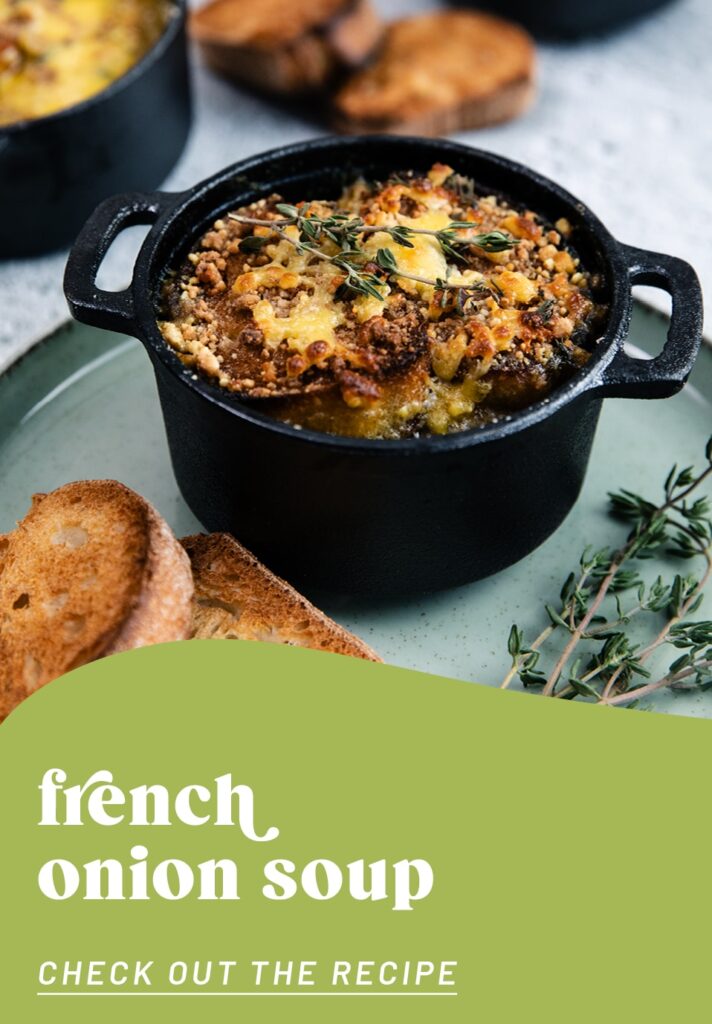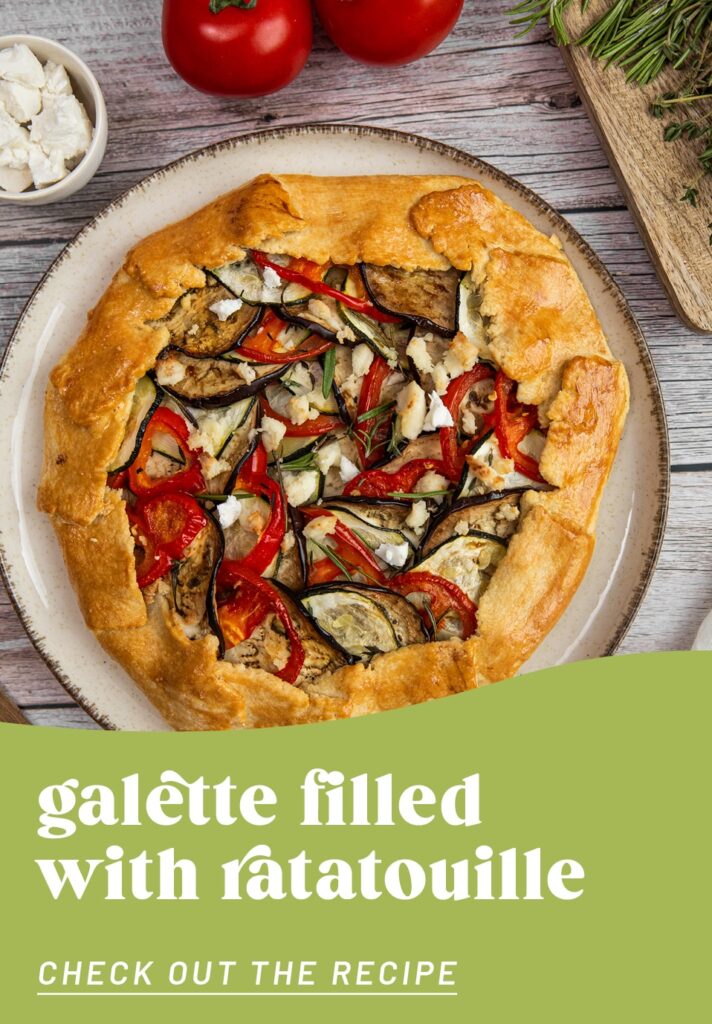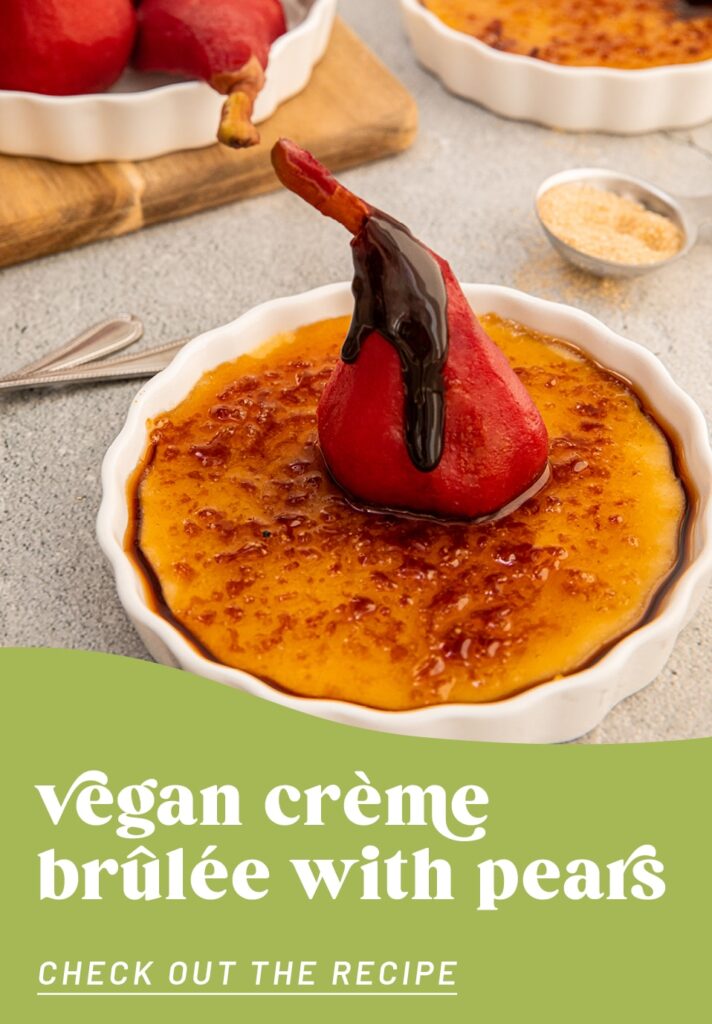VEGAN WORLDTRIP
Plant-based feasting in France


French cuisine à la vegan – is that possible?
Coq au vin! Meat dishes! An endless variety of cheeses! When we think of French cuisine, those are perhaps the first things that spring to mind. So not exactly rosy or green prospects if you want to go on a vegan tour of the neighbouring country. Or maybe they are?
Admittedly, the percentage of vegan French people is still quite low. And life is not made especially easy for vegan producers in the land of gourmets. For example, vegan substitute products are not allowed to have meat descriptions in their names. It would appear that they are even stricter than here. You won’t find a vegan schnitzel or a vegan burger on the shelf, at least not described as such.
In this article, we show you that the trend towards animal product free cuisine is also growing ‘en France’, albeit perhaps more slowly than elsewhere. Even a first Michelin star has already been awarded to a French vegan restaurant! We have compiled a brief portrait of the country, the best vegan recipes of the cuisine française, restaurant recommendations and tips on the diverse beautiful regions for you.
After all, France, which was the inventor of the Michelin star and haute cuisine, often boasts that it is the home of culinary culture in general. That’s not what we are asserting at all. But it’s worth taking a look at our next-door neighbour: Join us on an epicurean journey extending between the Atlantic and the Mediterranean!
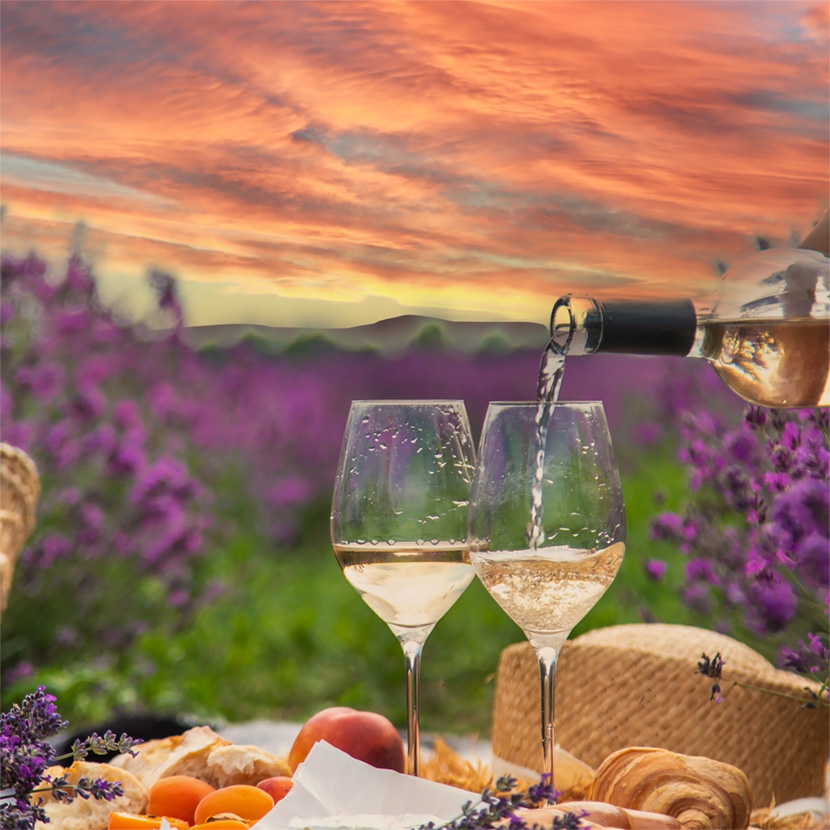

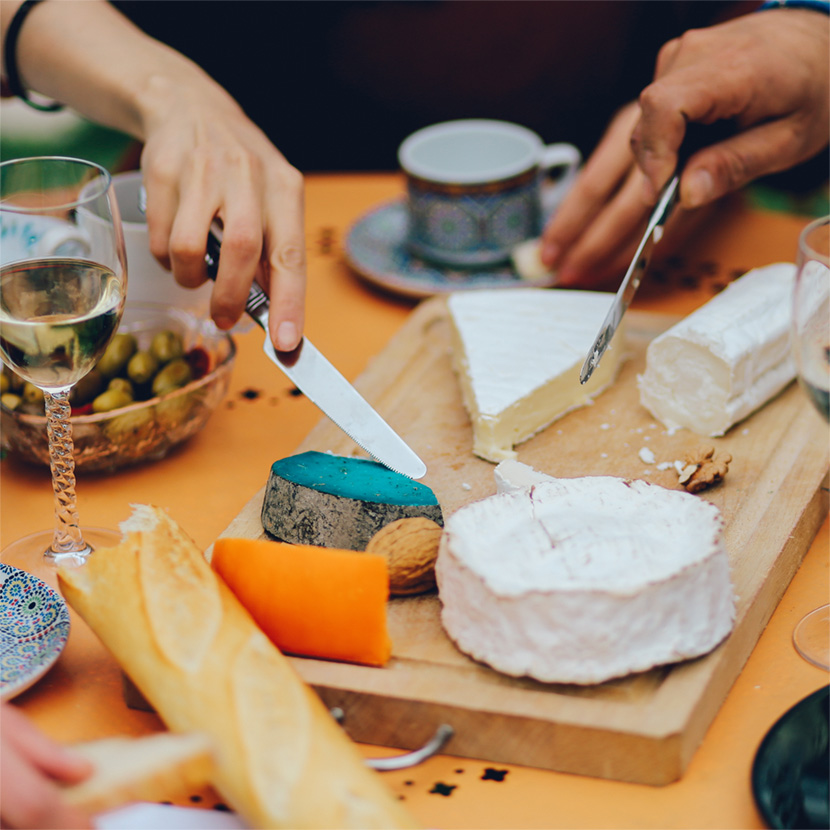
The secret of French cuisine
What is it about French cuisine? So sophisticated, yet so simple. What lies at the heart of this apparent paradox? As the ‘Pope’ of French cuisine, Paul Bocuse, who died in 2018, knew, the three main ingredients for French chefs are butter, butter, butter ;-). Then there is the partiality to cream, crème fraîche and cheese, which give dishes that certain “je ne sais quoi”. So, once you have good alternatives to these dairy products, you have a wide range of recipes for typical French buttery-creamy sauces, gratins, desserts and side dishes from A for aligot (mashed potato and cheese) to V for vinaigrette.
Despite this certain lavish decadence, French cooks use far fewer spices than Indian ones, for example. In many cases, the list of ingredients is rather short. The quality is very important. French cuisine can be described as ‘posh’. However, you will find this word interpreted very differently in the individual regions of France. The rural regions have quite hearty offerings, where many an animal is served that would make even meat eaters in this country turn up their noses. Fresh fish and seafood is found on the coastline. Then there are delicious crêpes & galettes. In the cities, you are spoilt for choice with the exquisite variations of all manner of dishes.
The French culinary ABC would not be complete without W for wine. Go on a fantastic journey of discovery to the wine regions in Beaujolais, from the Pays de Loire to Alsace, as well as in Languedoc and even on the island of Corsica. Fortunately, true grape connoisseurs will also find good vegan wines.
If you think of the exquisite patisseries, with all the delicate pastries…all waiting to be veganised — you could write a travel guide just on that.
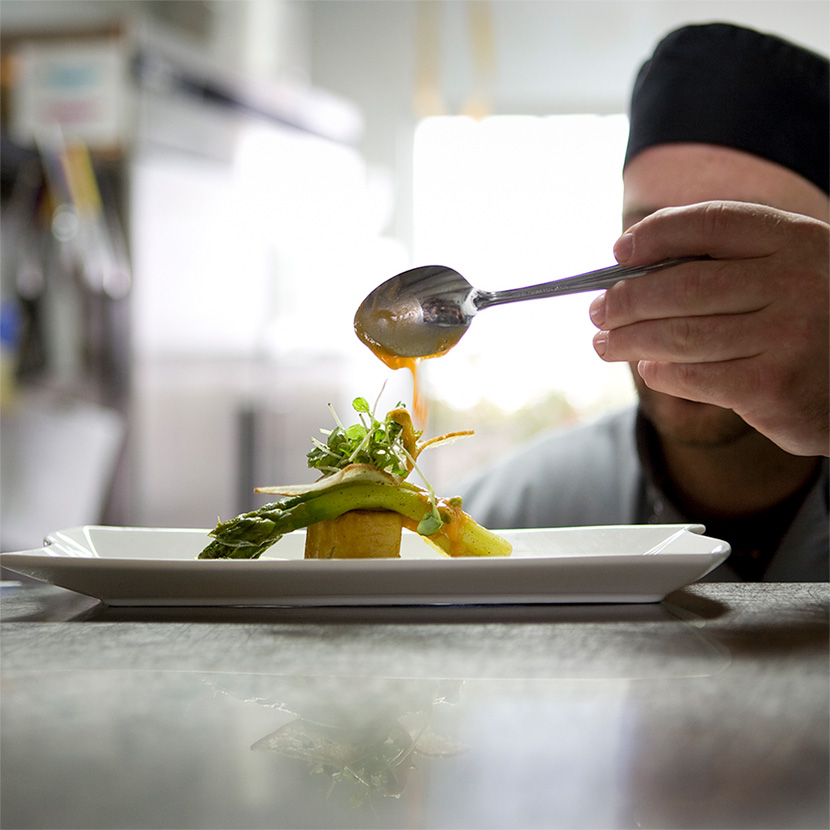
Vive la Pâtisserie!
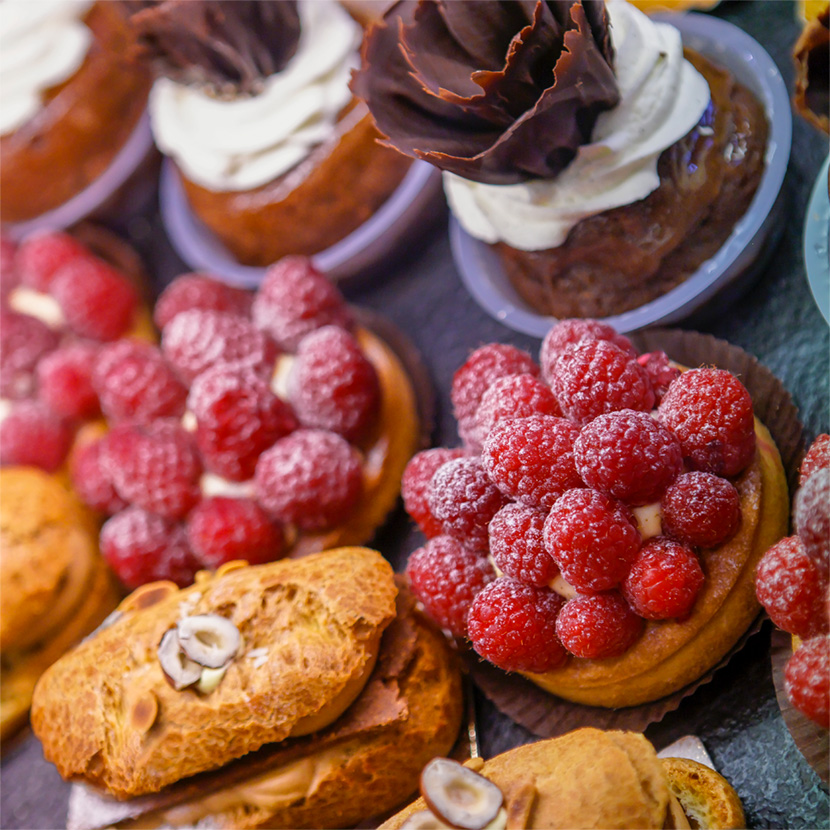
Such a sweet ‘Tour de France’ starts with croissants, brioches and madeleines (small sponge cakes often flavoured with lemon and or almonds). And moves on to delectable sweet treats such as:
- éclaire (fun-filled choux pastry, with the less than charming name of ‘dog bones’ in German)
- profiterole (round cream puffs, often coated in chocolate),
- macarons
Finishing off with delicious tartes (flat, round shortcrust cases, usually topped with fruit, which are of course also available in savoury versions) and wonderfully fluffy soufflés (using egg substitutes of course). In addition you have the multitude of desserts such as mousse au chocolat and crème brûlée. Don’t miss our version with pears poached in red wine, a real highlight for any banquet or dinner table. In a nutshell: variety is the name of the game in our neighbouring country — time and again.
France = diversity
So, let’s set off on our journey. A trip to France can mean different things. The cultural sights and sounds are as varied as the 22 regions, which, they say, cover all types of terrain — except the jungle and desert. From the skiers‘ El Dorado in the high mountains to fine sandy beaches under the Mediterranean sun, from wild rivers and volcanic landscapes to sun-drenched vineyards and the spectacular rocky coasts of Brittany. The scenery is as diverse as can be. And there is something for every traveller’s taste. There are vast areas of undulating picture-book landscapes, just like the ones out of Asterix which we know so well, all dotted with lovely villages and picturesque castles.
At every turn, travellers to France come across time-honoured sites that date back to the megalithic culture, for example in the caves and giant stones of the Dordogne. The Romans also left their mark which you can admire in Nîmes, Arles and Avignon, among other places. Medieval, mystical cathedrals rise up in the middle of the green landscape. The most impressive are probably Chârtres and Reims (in the heart of the Champagne region, which gave its name to champagne) and of course Nôtre-Dame in Paris. But perhaps you would prefer a Baroque castle? The fairy-tale buildings on the Loire or Versailles near Paris are an absolute magnet for tourists.
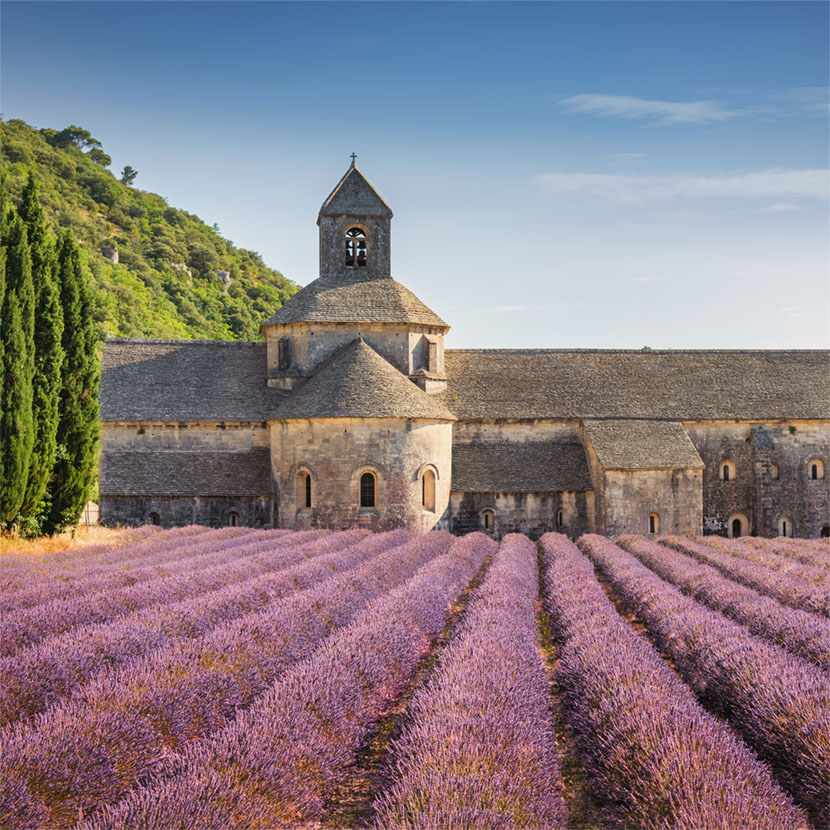
Paris — the heart and melting pot of the country

The cosmopolitan city of Paris is a dream destination and a pulsating metropolis! Not only do you find people from all around the world as well as first-class cultural events throughout the year, but also the most refined cuisine.
We’ll let you into a secret in a bit: The most laidback holiday for vegans is in Paris. This is where you can source delicacies from all the continents and now a considerable number of vegan and vegetarian restaurants and products in the shops. Some top restaurants, such as Le Chiberta, create vegan specialities on request if you have a reservation. But you can also find 100% vegan bistros in several districts, such as Gentle Gourmet on the secluded Saint-Martin canal, Le potager de Charlotte in the 9th arrondissement or Le Potager du Marais (‘The Marais Vegetable Garden’), which conjures up vegan versions of French classics. By the way, the Marais is one of the most romantic districts of the city and is definitely worth strolling through. And how about other regions, especially in the countryside? Well, here you have to ‘cherry pick’ from the excellent regional cuisines …
Savoir-vivre from Alsace to Provence, from Brittany to the Pyrenees
France is synonymous with its joie de vivre. And this does not just apply to its capital. Every region of France boasts its cultural heritage, its way of life, its soils and wines, its vegetation as well as its unique specialities
Galette and crêpes can be found in Brittany, Calvados and cider in Normandy. In Picardy, close to Belgium, lots of potatoes, beetroot and cabbages are often served up in hearty stews. The Périgord is a paradise for food aficionados, tickling the taste buds with walnuts, figs, chestnuts, mushrooms and truffles (the truffle markets in winter are popular with gourmets). Who says you need foie gras?
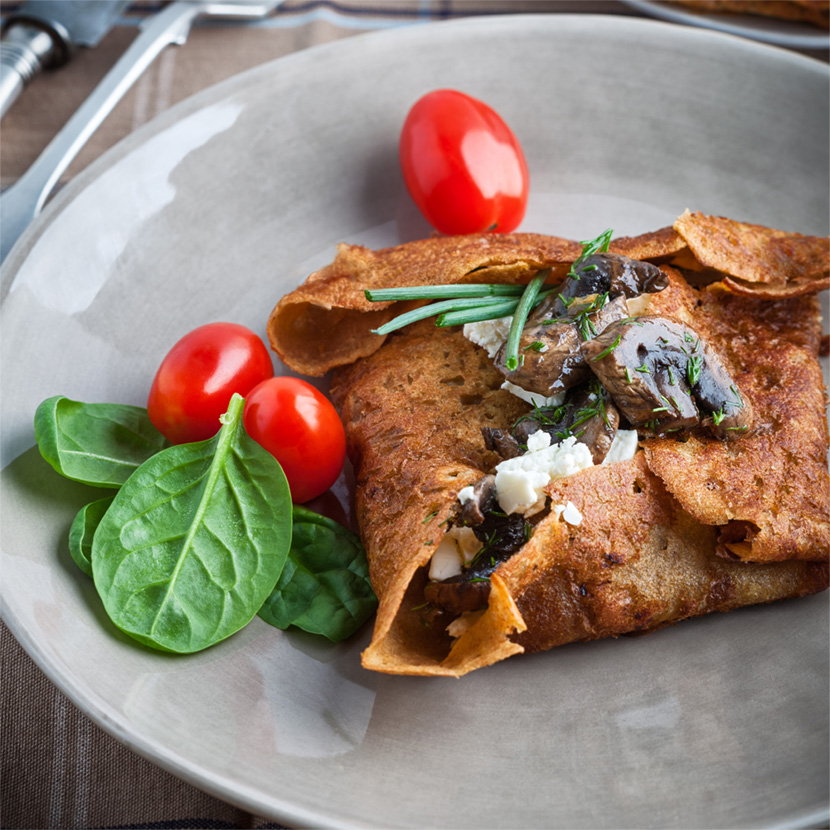
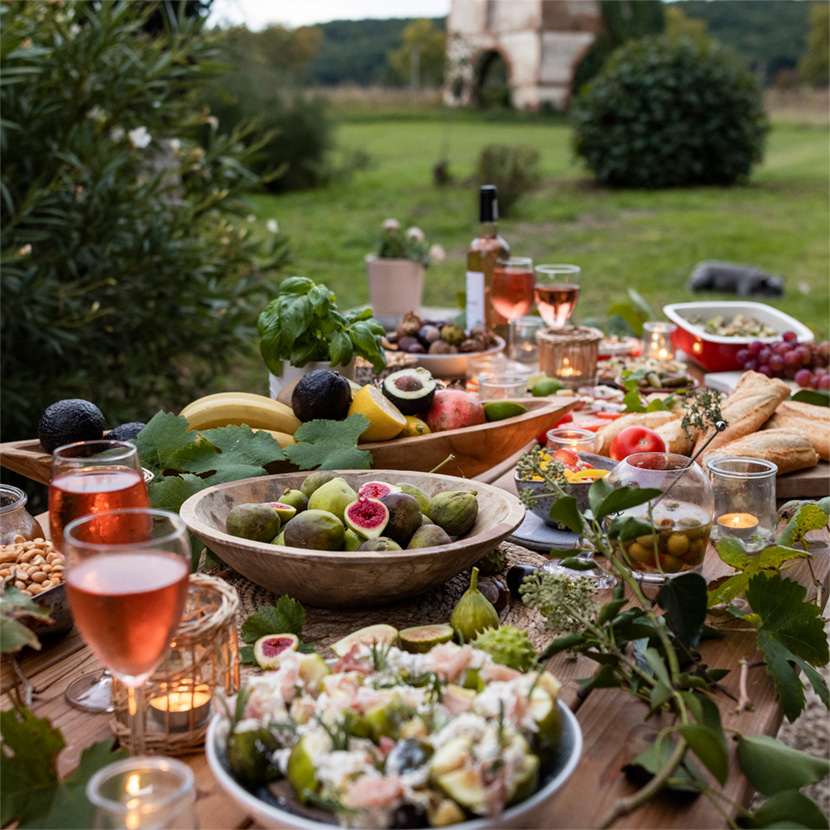
Famous Dijon mustards and wonderful ruby-red wines await you in Burgundy (without any snails having to swim in them),- tarte flambée that can incidentally be easily turned into a vegan version and sauerkraut (choucroute) in Alsace. The Provence offers hearty dishes with its wonderfully aromatic herbs, sun-ripened fruit and vegetables. The popular ratatouille is just a prime example of how vegans can also be happy here. Equally delicious are all kinds of dishes with artichokes and lentils. In autumn, the forests of the Gascogne or the Jura Mountains are a paradise for mushroom pickers.
Especially when, from the end of June, entire hills glow lavender-blue, and there always seems to be a pinch of marjoram, thyme, oregano and rosemary in the air, a Provence holiday that touches all your senses is well worthwhile. And just in time before the summer crowds peak.
On the Côte d’Azur, tomatoes, garlic, almonds and lemons are indispensable in the kitchen. And why not try a salade niçoise with tuna substitute? Languedoc inspires delicious vegan cassoulet variations, stews with beans, onions and vegetables. The golden yellow couscous that has migrated from North Africa is as delicious as it is vegan if you order it with vegetables.
Finally, the cuisine around Biarritz has Spanish influences. Here you can find top vegan cuisine, including XuXu restaurant. A little further north, there is Bordeaux to discover, the city that gave its name to the world-famous Bordeaux wines.
A first vegan star next door
France is proud of its Michelin stars. Vegan French cuisine has been awarded a star right here on the Atlantic: in the Bay of Arcachon in Arès, a small coastal town near Bordeaux, the ONA of the young chef Claire Vallée shines. ONA means “Origine Non-Animale” (animal-free origin) Claire Vallée’s starting point was whether we can eat well ecologically and ethically without sacrificing the taste. The self-taught chef has impressively demonstrated this at her restaurant. Gaining a star to boot. In 2021, the Michelin Guide awarded her the coveted distinction (similarly encouraging as the first star for a vegan restaurant ever, Ricky Saward’s Seven Swans, which we tell you about here. So vegan creativity is flourishing in France too!
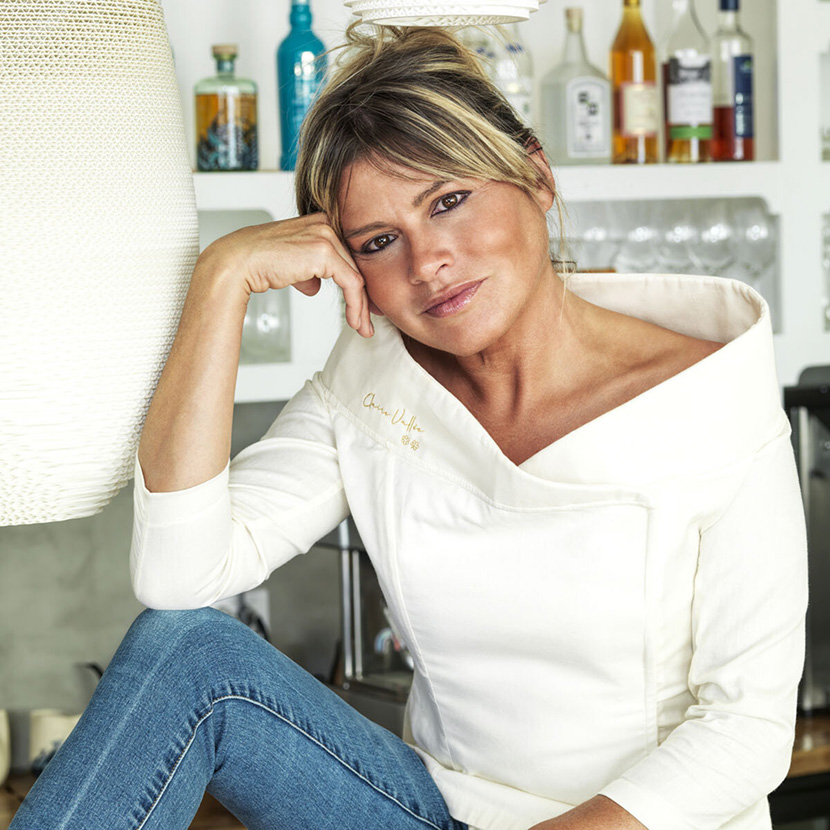
Going out for an exotic meal …
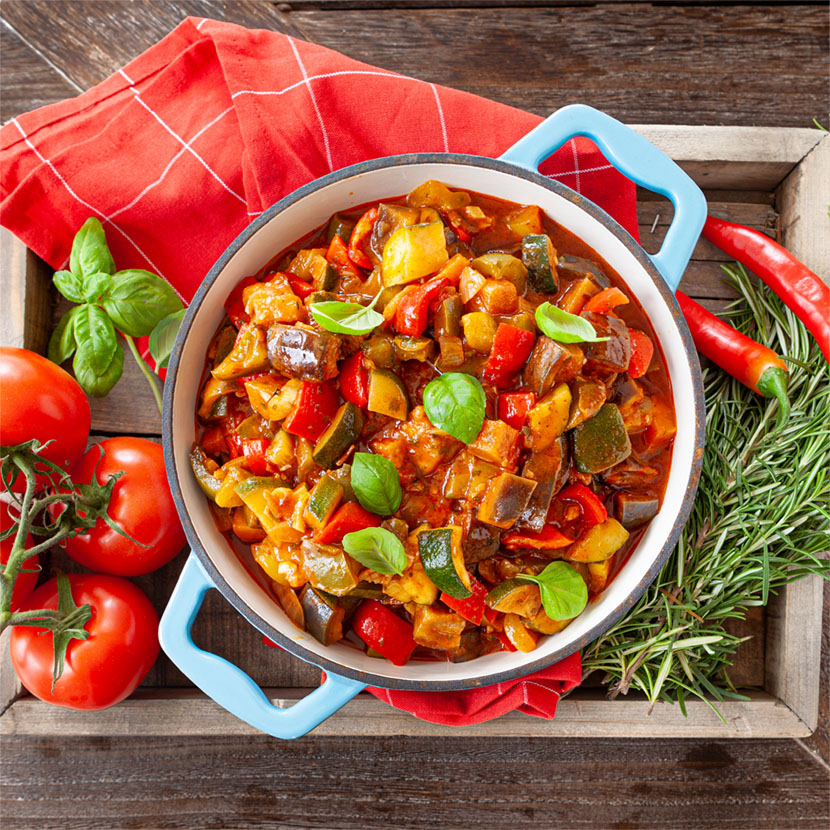
Vegan restaurants, such as those found in the big cities – apart from Paris, that is – Lyon (e.g. the Culina Hortus), Marseilles (L’Écomotive), Lille (De Rode Koe) and Bordeaux (the ONA, see above) – you often still (!) search for in vain in the provinces. Vegan food is still not very popular here yet. But don’t worry: you don’t have to starve. After all, there are dishes in France that are traditionally vegan. The most famous of these is undoubtedly ratatouille made from courgettes, aubergines and tomatoes in countless variations. But the delicious tapenade of black olives (choose some without anchovy!), capers, and lemon with fresh baguette is also a vegan treat.
France’s greatest vegan asset is again its diversity. Its colonial history means there are Asian and North African restaurants almost everywhere, whose menus have delicious treasures to offer vegans. From Morocco, Algeria and other Maghreb countries as well as from Lebanon come the delicious hummus, vegetable tajine, tabbouleh (couscous or cracked wheat salad) and fresh creations with chickpeas and pomegranate. The fantastic vegetable pho and summer rolls are examples of its Vietnamese heritage.
Other surprisingly different and surprisingly yummy flavours are offered by the cuisines of West Africa, for example sweet potato and ginger cake from the Ivory Coast or the Maafe peanut and vegetable stews from Senegal. Those who like African-Asian fusion can try the Lasopy vegetable soup from Madagascar. France has it all.
… or cook yourself
Instead of going to a restaurant, there is always the option of picking up a cooking spoon yourself. The gigantic French supermarkets offer everything your heart and plant-loving stomach could desire. Here you might discover vegan products you didn’t know you had at home, such as a pistachio drink. So look out for Carrefour and Cora. Or go to the organic food shops. Like Biocoop or Naturalia, for example. And also the small African, Asian delicatessens in the cities offer a lot of interesting and exotic flavours for vegan taste buds.

Fresh from the market
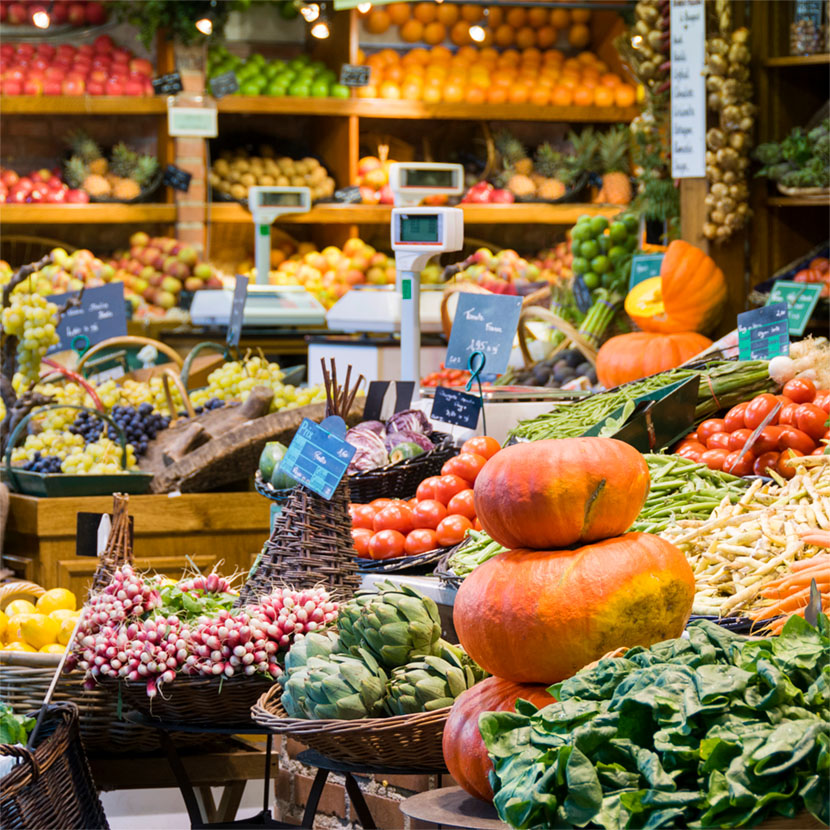
We always recommend a stroll through the weekly markets that can be found in every French town — small or large. You might want to steer clear of the intense wafting fish stalls… and spend longer at the stalls with fresh fruit and vegetables, spicy pickled tomatoes and olives – including olive pastes – crystallised fruits, nuts, spices and herbs. Herbes de Provence (herbs of the Provence) is only the best-known blend.
By the way, herbs are the icing on the cake in French cuisine. Together with a fresh baguette, a wonderful picnic can be put together here, even for vegans, which you can then eat somewhere cosily under an olive tree. Afterwards, a long siesta is just what you need …
Typical French also for vegan fans
In the same way that France isn’t just about the Eiffel Tower, French cuisine cannot be reduced to coq au vin, as we have seen. Travelling vegan across France can be an absolute pleasure if you know where to find the right food. In the big cities, plant-based dining is usually pretty straightforward. In the rural regions, frankly, you are going to need a lot more imagination. But no matter where you go in France, you can buy fresh food that appeals to all your senses. In addition to appetising food, there’s also plenty of culture, magnificent landscapes and French charm … so that your mind and soul are also satisfied. 🙂
And if you’re in the mood for French cuisine and want a bit more luxury when eating à la vegan at home, we recommend our recipe ideas. Here you will find traditional vegan dishes as well as creative adaptations of famous French classics that will make your mouth water. Bon appétit!
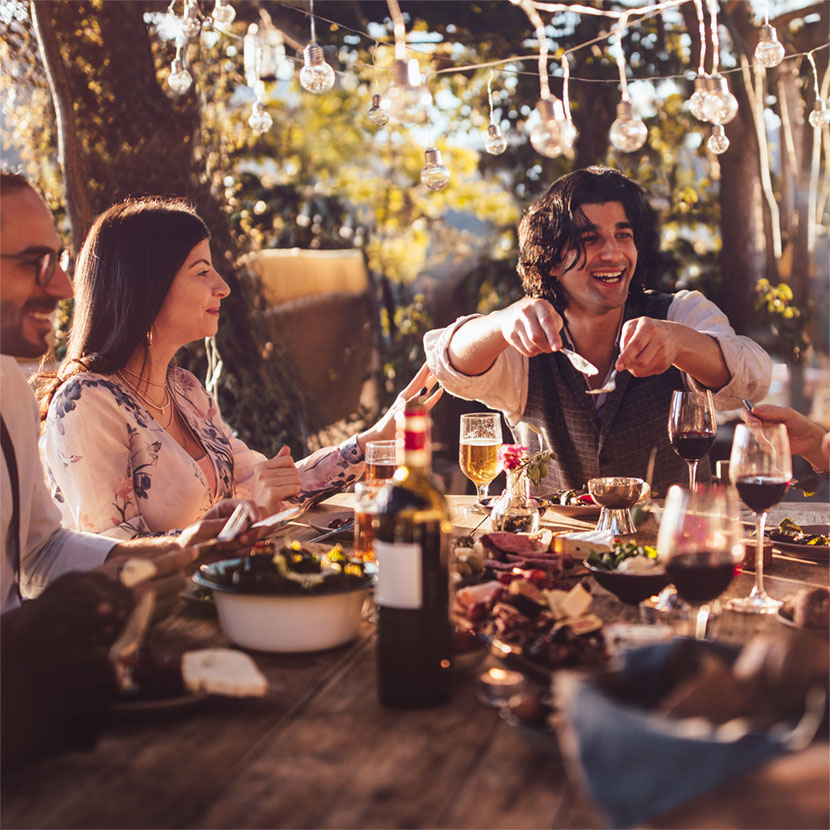
9 extra tips for your French culinary experience:
- Supermarket experience: In between all the sightseeing and holiday adventures: take time to explore the gigantic hypermarkets. They also offer all kinds of delicious food for vegan travellers.
- Relaxed aperitif hour: In France, the aperitif culture is very much alive. A glass of pastis, kir made from white wine and crème de cassis (it’s best to ask for ‘vegan friendly’) or non-alcoholic refreshments are often accompanied by some nibbles such as nuts or olives. And if you organise your own ‘apéro’, make sure your snacks are vegan.
- Everything revolves around food: Food is a central topic for the French. Remember this at business meetings, too; a meal together in a restaurant is very important. Signal to your business partners that you are happy to join in if they can offer something vegan. Or here’s our tip – suggest a Vietnamese or Moroccan restaurant.
- Multi-course meals: A meal in France is almost always a series of dishes, at least a three-course meal. Only at lunchtime, especially in Paris, can it be a simple dish like a quiche.
- Side dishes: Except perhaps at busy times, staff are usually willing to accommodate extra requests. For example, to substitute double a side dish for the non-vegan main course.
- And remember: Ratatouille always goes 😉
- Check out the app “Happycow” which you can use as a restaurant finder.
- Parler un peu français: When talking to a waiter or waitress, and in general, it is helpful to speak at least a little French or to know a few phrases. Among young people in the cities, however, English is hardly a problem anymore.
- Self-catering: In France, it can be a good idea to stay in a flat instead of a hotel, so you can turn your freshly bought ingredients into your favourite vegan dishes. We’ve veganised our favourite French recipes for you.
Vive la cuisine française – but please, vegan style!
recipes
Did we make you want to travel to France in your own kitchen? Check out our all-time favorite vegan French recipes. C’est bon !
